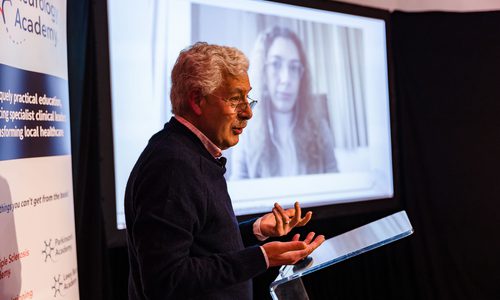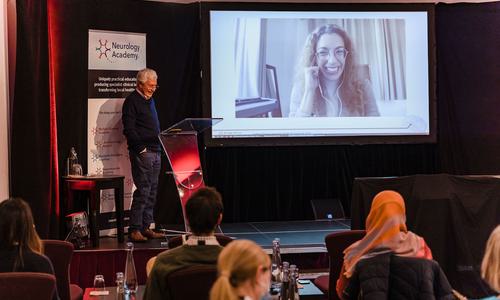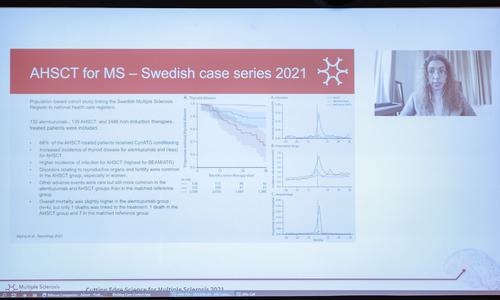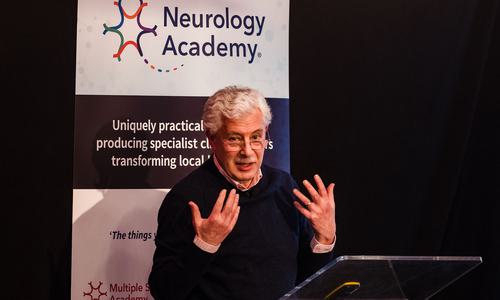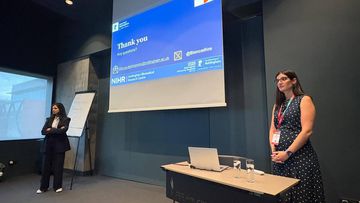Debate: Non-myeloablative HSCT should be offered as a firstline DMT - MS Cutting Edge Science
Event reportsDr Miriam Mattoscio
Consultant neurologist, Queen’s Hospital, Barking Havering and Redbridge University Hospitals Trust
Prof Basil Sharrack
Consultant neurologist, Royal Hallamshire Hospital, Sheffield
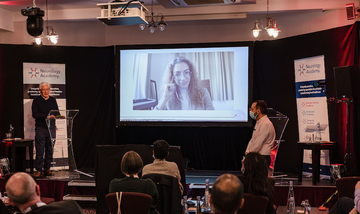
This session is part of a series of write-ups on Cutting Edge Science for Multiple Sclerosis 2021; the conference summary for which is here. The conference was chaired by Dr Wallace Brownlee.
Against: Dr Miriam Mattoscio
Dr Miriam Mattoscio
“There is no doubt (in the published clinical trial data) that when compared with the trials of disease modifying therapies (DMTs), HSCT is very effective.
“But these are not all the results of comparative trials. We need to see more compelling evidence if we are going to be able to use this treatment appropriately, in the right patients, especially as first line,” she said.
While studies have shown that intermediate non-myeloablative conditioning is better tolerated than myeloablative or high intensity conditioning, safety concerns remain, she went on.
Significant complications, including infection and even death, can occur in the early stages of the post-transplant period. And while mortality rates have reduced in recent years, it is still an important issue, Miriam said.
There is also a fertility concern, particularly for women, the long-term safety profile is unclear, and the community is “still debating the optimal intensity of the conditioning regimen needed to achieve efficacy”.
“The highly effective treatments currently accessible at firstline are, overall, safer – at least in the short and medium term – despite the fact that long-term safety data are lacking also for those,” said Miriam.
For: Professor Basil Sharrack
Professor Basil Sharrack
“We should not use a hammer to crack every nut, but we also need to use this treatment before the horse has bolted,” he said.
He pointed to the Multiple Sclerosis International Stem Cell Transplant (MIST) randomised controlled trial. It randomised 110 patients with highly active relapsing-remitting MS (RRMS) to HSCT, or a DMT of a higher efficacy or different class then their previous treatment.
After one year, those in the HSCT group saw their Expanded Disability Status Scale (EDSS) reduce by an average of 1.02 point, and three of the 55 patients experienced disease progression. In the DMT group, the average reduction was 0.67 EDSS points, and 34 of 55 experienced disease progression.
However, MS is a heterogenous disease, and HSCT is not the right first line option for everyone, he went on.
A retrospective analysis of Swedish data looked at 40 people with RRMS and eight people with progressive MS who underwent HSCT between 2004 and 2013.
“Those who really got benefit were those who had the illness for shorter duration, those who are not very disabled, and those who had a lot of Gad-enhancing lesions,” said Basil, adding that the treatment mortality rate was 0%.
Summing up, he said there was a group of people who have frequent, severe relapses, and incomplete recovery.
“There is a very, very short therapeutic window for them to be treated, and they should really be offered stem cell transplantation,” he said.
Reference
Burt, R. K., Balabanov, R., Burman, J., Sharrack, B., Snowden, J. A., Oliveira, M. C., ... & Helenowski, I. B. (2019). Effect of nonmyeloablative hematopoietic stem cell transplantation vs continued disease-modifying therapy on disease progression in patients with relapsing-remitting multiple sclerosis: a randomized clinical trial. Jama, 321(2), 165-174.
This activity has been supported by sponsorship from Roche Products Ltd, Biogen Idec Ltd and Janssen-Cilag Ltd. The sponsors have had no control over the educational content of this activity.

Related articles
Encouraging excellence, developing leaders, inspiring change
MS Academy was established in 2016 and in that time has accomplished a huge amount with exciting feedback demonstrating delegates feel inspired and energised along their personal and service development journeys. The various different levels of specialist MS training we offer are dedicated to case-based learning and practical application of cutting edge research.


